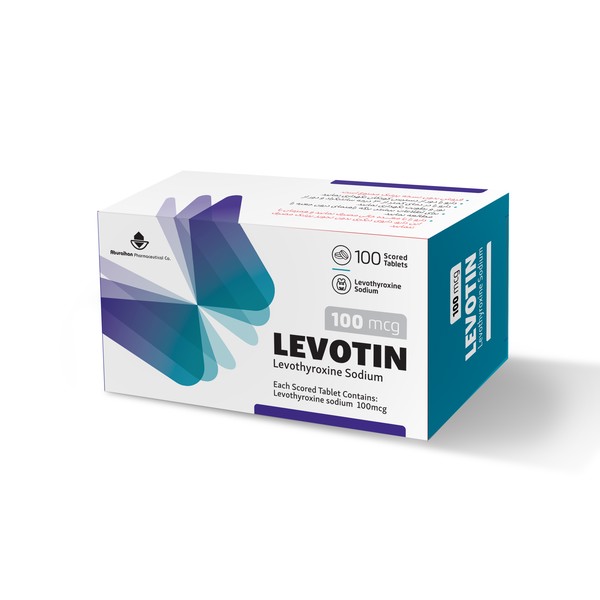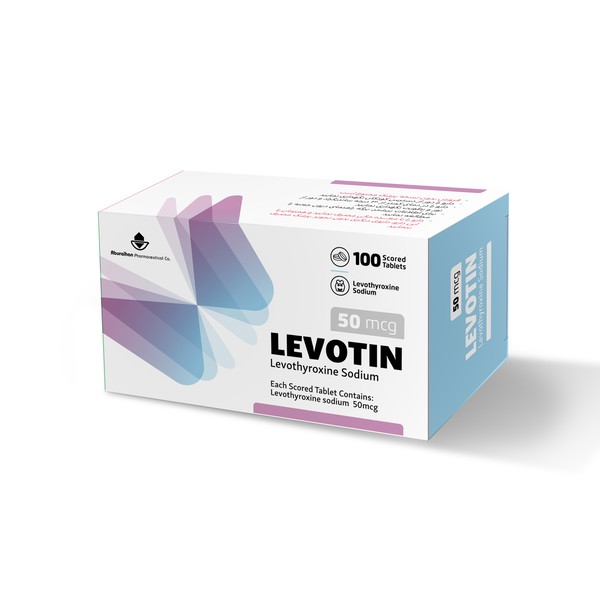Levotin®
levothyroxine Sodium
Film coted Tablet 50,100 mcg
Levotin ® is indicated for:
- Hypothyroidism: As replacement therapy in primary (thyroidal), secondary (pituitary), and tertiary (hypothalamic) congenital or acquired hypothyroidism.
- Pituitary Thyrotropin (Thyroid-Stimulating Hormone, TSH) Suppression: As an adjunct to surgery and radioiodine therapy in the management of thyrotropin-dependent well-differentiated thyroid cancer.
Mechanism of Action:
Thyroid hormones
Method of Administration:
- Administer once daily, preferably on an empty stomach, one-half to one hour before breakfast.
- Administer at least 4 hours before or after drugs that are known to interfere with absorption.
- Evaluate the need for dose adjustments when regularly administering within one hour of certain foods that may affect absorption.
- Starting dose depends on a variety of factors, including age, body weight, cardiovascular status, and concomitant medications. Peak therapeutic effect may not be attained for 4-6 weeks.
- Adequacy of therapy determined with periodic monitoring of TSH and/or T4 as well as clinical status.
Notes
Contraindications:
Uncorrected adrenal insufficiency and untreated subclinical thyrotoxicosis.
Not indicated for suppression of benign thyroid nodules and nontoxic diffuse goiter in iodine-sufficient patients
Not indicated for treatment of hypothyroidism during the recovery phase of subacute thyroiditis.
Interactions:
Many drugs can exert effects on thyroid hormone pharmacokinetics and metabolism (e.g., absorption, synthesis, secretion, catabolism, protein binding, and target tissue response) and may alter the therapeutic response to levotin®.
Amiodarone, glucocorticoids, antacids (separate administration by at least 4hours), beta blockers, carbamazepine, hydantoins, phenobarbital, rifampin, estrogens, furosemide,
heparin, SSRI, tricyclic antidepressants, tetracyclic antidepressants, ketamine, digitalis glycosides, anticoagulants, antidiabetic agents, sympathomimetics.
Pregnancy and Lactation:
Pregnancy category: A
Do not discontinue thyroid replacement therapy in hypothyroid women during pregnancy
Pregnancy may require the use of higher doses of levothyroxine.
Lactation: minimal amounts of thyroid hormones are excreted in breast milk.
Warning and Precaution:
Cardiac adverse reactions in the elderly and in patients with underlying cardiovascular disease: Initiate levotin® at less than the full replacement dose because of the increased risk of cardiac adverse reactions, including atrial fibrillation.
- Myxedema coma: Do not use oral thyroid hormone drug products to treat myxedema coma.
- Acute adrenal crisis in patients with concomitant adrenal insufficiency: Treat with replacement glucocorticoids prior to initiation of levotin ®.
- Prevention of hyperthyroidism or incomplete treatment of hypothyroidism: Proper dose titration and careful monitoring is critical to prevent the persistence of hypothyroidism or the development of hyperthyroidism.
- Worsening of diabetic control: Therapy in patients with diabetes mellitus may worsen glycemic control and result in increased antidiabetic agent or insulin requirements. Carefully monitor glycemic control after starting, changing, or discontinuing thyroid hormone therapy.
- Decreased bone mineral density associated with thyroid hormone overreplacement: Over-replacement can increase bone resorption and decrease bone mineral density. Give the lowest effective dose.
Adverse Reactions:
Adverse reactions associated with Levotin® therapy are primarily those of hyperthyroidism due to therapeutic overdosage: arrhythmias, myocardial infarction, dyspnea, muscle spasm, headache, nervousness, irritability, insomnia, tremors, muscle weakness, increased appetite, weight loss, diarrhea, heat intolerance, menstrual irregularities, and skin rash.
Storage:
Store below 30 and protect from light and moisture.


